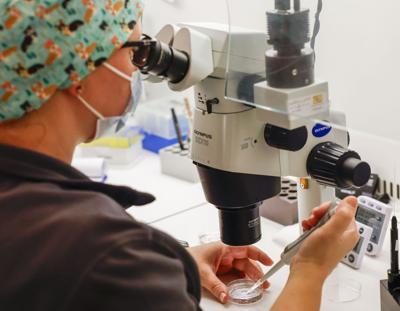The Louisiana House Committee on Civil Law and Procedure on Monday advanced without objection two bills aimed at protecting access to IVF in the state, in response to an Alabama Supreme Court ruling in February that essentially halted access to the procedures there.
House Bill 833 by Rep. Paula Davis, a Baton Rouge Republican, and House Bill 742 by Rep. Denise Marcelle, a Baton Rouge Democrat, would keep IVF providers from being sued if something happens to the embryos in their care as long as they’re acting “in good faith” and with “reasonable care and diligence.”
The committee’s response to the bills signals bipartisan support for safeguarding access to IVF, also known as in vitro fertilization, a process in which an egg is fertilized with sperm in a lab, outside of the body, and later implanted into the uterus. It can be a fertility treatment option for people who are struggling to become pregnant.
“I think this a very pro-family bill,” said Rep. Chad Brown, a Plaquemine Democrat, of Davis’ bill. “I don't know that there's anything more pro-family than a family that goes through the pressure and the time, and a lot of times the expenses, of trying to start a family (through IVF).”
Davis’ bill also changes the definition of a “human embryo” to remove the part in current law that says “it will develop into utero and an unborn child.”
Katie Bliss, an infertility lawyer involved in crafting the legislation, said they wanted to “remove the idea that every human embryo will develop in utero into an unborn child.”
“That's just unfortunately, not the case.” Bliss said. “In the natural case, that's not the case, and also in the world of IVF, that's not the case.”
The bill also specifies that an embryo is “viable” when it continues to develop in a healthy manner 36 hours from fertilization and “non-viable when it fails to continue to develop” after that timeframe, unless it’s being preserved. It contains language saying embryos will be presumed to be viable unless determined to be non-viable.
Marcelle said she and Davis worked on their bills independently of one another, and that Davis amended her bill to include language from Marcelle’s. She said they might end up merging the two bills into one.
IVF access in Louisiana was made both possible and complicated by a 1986 law. That law bans the “intentional” destruction of embryos created during IVF in the state, since that was at the center of many objections to the process at the time.
Louisiana is the only state with such a law. As a result, most of the state’s major fertility clinics ship embryos not in use to be stored out-of-state.
Louisiana law classifies embryos “juridicial persons,” giving them some legal rights like they would a corporation but not the full legal rights of a person, like Alabama’s ruling did.
The Alabama Supreme Court suit was filed by three couples whose additional embryos were destroyed by a patient who entered the clinic’s storage unit, picked them up and dropped them. The couples sued under the state’s “Wrongful Death of a Minor Act,” and the court ruled that embryos created through IVF are considered children and therefore the law applied in this case.
Following the court’s decision, the Alabama Legislature passed a law so that providers, transporters or patients don’t get sued for destroying or damaging embryos. Two IVF providers started offering their services again but a third said it still didn’t have the legal protection it needs to feel comfortable doing the same.
One bill would decimate the state’s current public records law.





